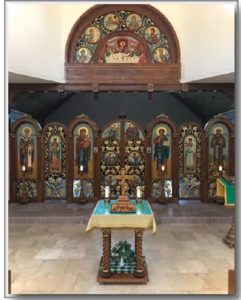(This article originally appeared in TAU-USA Summer/Fall 2019)
By Fr. Jerome Wolbert, OFM

Icon Screen, Chapel at Holy Dormition Byzantine
Franciscan Friary, Sybertsville, PA, where Fr. Jerome
Wolbert, OFM, a Byzantine Franciscan Friar, is Guardian.
One of my favorite St. Francis stories takes place at Rivo Torto. In the middle of the night, one of the brothers cries out, “I’m dying! I’m dying!” He feels like he is dying of hunger, so strict did he keep the fast, seeking only to eat as much (or as little) as St. Francis himself ate. But it was not enough for his body, so he cries out in the night. St. Francis wakes everyone up, and they eat a little snack together (see FA:ED 3, page 278). What a beautiful expression of fraternity!
We Franciscans talk about fraternity, but that word fraternity means different things to different people. One of the friars in my province, when he was young, first thought this would be like a college fraternity. Or maybe “Franciscan Family” gives some of us a better
intuition on what kind of fraternity we are called to live. But not all of us have the same expectations or experiences of our biological brothers and sisters.
Thankfully, we have the Franciscan tradition to give us some good examples of how to live this Gospel sense of fraternity, stories that we share in common that encourage and challenge us in living fraternity. The Rivo Torto experience teaches us something of the gentleness of our fraternal life, which is a fruit of the Holy Spirit (see Galatians 5:19-25). We might remember how St. Francis urges his brothers to make sure that a brother who has sinned always sees mercy rather than shame and scolding.
If any one of the brothers, at the instigation of the enemy, shall have sinned mortally, let him be bound by obedience to have recourse to his guardian. Let all the brothers who know that he has sinned not bring shame upon him or slander him; let them, instead, show great mercy to him and keep the sin of their brother very secret because those who are well do not need a physician, but the sick do. (Letter to a Minister)
St. Francis took great care to instruct those in leadership to show mercy even as they impose and enforce necessary regulations. When those in charge are unable to restrain the storm of their own emotions, their own feelings of offense, it becomes impossible to be gentle… the storm lashes against the guilty and the innocent. Cultivating humility, for example, helps us to sow other attitudes in our hearts that can help us to bear the fruit of gentleness. I can’t be harsh on someone because I am aware that I, too, am a sinner.
Thus, the tradition lives on today. I write this while visiting a friary where many of the friars are elderly, and praise God, even in their imperfections and foibles, they live a kind of gentle support and mutual encouragement that is a great light. This Christian light shining in the ordinary events of their lives and their welcome of guests must be what Jesus means when he tells us, “You are the light of the world” (Matthew 5:14).



Thank you Fr Jerome! Sharing this article with my fraternity!